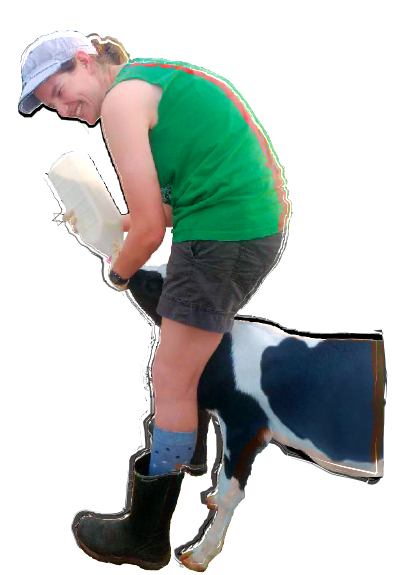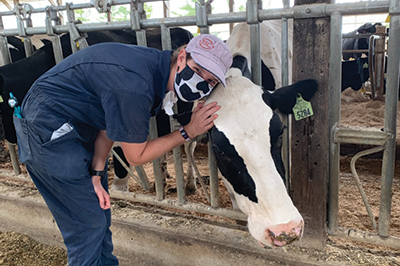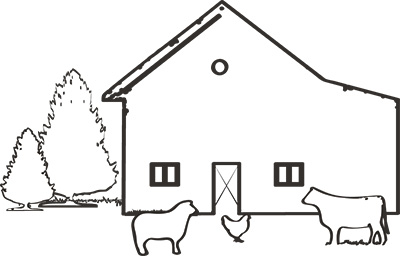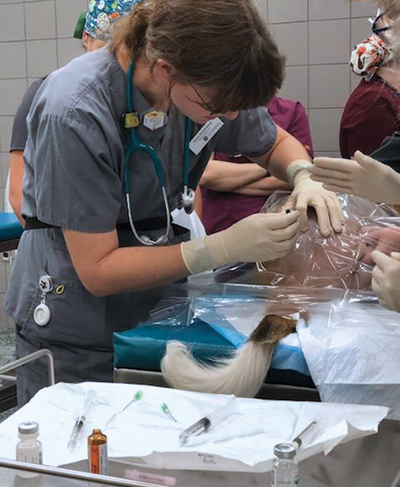

“If anyone knows me, I am cows, one hundred percent. I started working with them in college, and I have loved them ever since.” Katie Rottenberg’s passion shines through when she speaks on her work with large animals, especially dairy cows. She graduated from the Michigan State University College of Veterinary Medicine’s Veterinary Nursing Program in August 2022. However, her path to living and breathing large animal care and management began far earlier.
Growing up in Orange County, California, Rottenberg had cats, a turtle, and a bird. While Rottenberg always loved animals and wanted to be a veterinarian, she would get a chance to work with farm animals only when she got to high school. (Southern California isn’t exactly cow country.)
She joined her local branch of the National FFA Organization, a youth organization focused on a multidisciplinary approach to agricultural education. There, she was able to raise a sheep as a project for the entirety of her high school career, which gave her an up-close understanding of what it means to work with animals. “I fell in love with farm animals and decided that’s what I want to do,” she says.
A bachelor’s degree in animal science from California Polytechnic State University San Luis Obispo (2010-2014) cemented her path to work with animals, though it changed her trajectory from pursuing a Doctor of Veterinary Medicine degree. She learned of other careers surrounding farm animals and worked student farm jobs during her years of study — caring for sheep, managing calves, and milking cows.
As she realized that her student work could become a career, Rottenberg continued in the dairy industry instead of applying to a veterinary medicine program. She worked in dairy for six years; some of her many roles included calf manager, calf esearch trial assistant, milker, and assistant herdsman. These positions were scattered across California, New York, Wisconsin, and Michigan, including the MSU Dairy Farm, where her past dairy experience contributed to improving standard procedures and training for the farm.


Rottenberg noted the types of cow care and treatment recommended by veterinary professionals. She became interested in the veterinary methods of caring for cattle beyond what she had learned about animal science thus far. “I’m doing all this, but why? Why are we giving these treatments to the animals? I wanted to know a little more in-depth on the nursing side of things, and that’s when I decided to go back to school,” she says.
Rottenberg joined the Veterinary Nursing Program amid the COVID-19 pandemic in 2020. Despite this, Rottenberg was able to gain the technical knowledge she was looking for. “Once COVID calmed down a little bit, I really appreciated having the ability to practice on live animals and to have the guidance of the teachers there,” she says.
Hands-on learning is a running theme in Rottenberg’s life. Her desire to learn comes from a place of deep care for her animals, and honing her practical skills means she can ensure the best care possible. "I knew from my job how to draw blood from a calf, but was I actually doing it correctly? So [the Veterinary Nursing Program] was nice to improve my actual technical skills.”
Now Rottenberg is back in Southern California, reconnecting with family, and looking to put her new expertise to use with farm animals. “My dream is to work with farm animals in whatever capacity,” she says. “Whether I’m a caretaker, or I can use my vet tech skills, that would be amazing.”
While she’s been job hunting, Rottenberg’s in a temporary position handling succulents. “I have been learning a lot and my co-workers are teaching me the ropes about the plant side of the agriculture world,” she says.
Regardless of the field, Rottenberg learns best with her feet on the ground and her hands busy picking up practical skills. She benefited from the practical and experiential learning of the Veterinary Nursing Program, and credits FFA for nurturing her early passions. Rottenberg says that without experiences in her high school FFA she may not have been able to work with cows or farm animals at all.
“I grew up in Orange County; who’s going to let me touch a large animal?” she jokes.
Rottenberg also shares the advice she tries to live by when it comes to pursuing new interests, whether in education or career. “The worst possible thing that can happen is they say ‘No,’ and you’ll move on.” Rottenberg’s determination and passion for new practical experiences is what led her to do the work she has enjoyed most in life.
It’s a motto with continuing success—Rottenberg has been offered a position as an Animal Manager. If she accepts, she’ll be working with many species including managing some rarer species for the first time, as well as the cows she knows and loves.
“If you’re scared of touching a cow, you may not know that [cows] might be your new passion.” She shrugs and smiles. “Again, the worst thing that can happen is that they say ‘No.’” 

